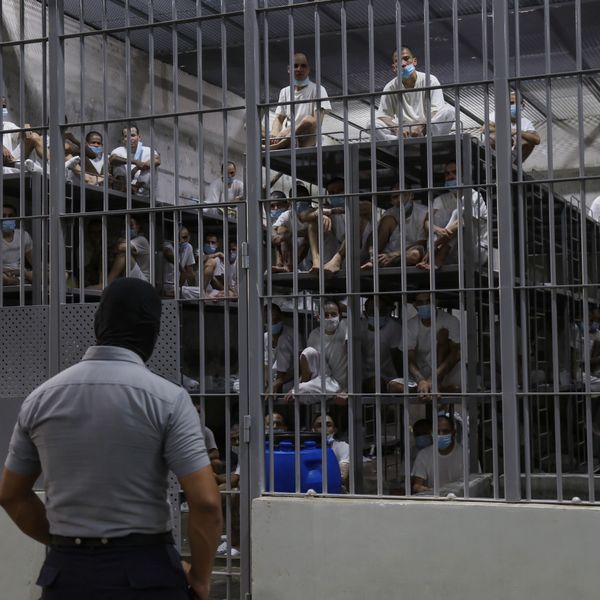WikiLeaks Reveals 'Systematized Human Rights Abuses' at US Detention Facilities
Docs show 'anatomy of the beast that is post-9/11 detention'
Whistle-blowing website WikiLeaks released a new series of secret files from the US government Wednesday pertaining to treatment of foreign prisoners at military prisons such as Guantanamo Bay, including guidelines for military officials that reveal vast institutionalized human rights abuses.
According to WikiLeaks, the documents, which include the 2002 manual for staff at Camp Delta at Guantanamo, reveal "a formal policy of terrorizing detainees during interrogations, combined with a policy of destroying interrogation recordings," which have "led to abuse and impunity" among US officials.
"The 'Detainee Policies' show the anatomy of the beast that is post-9/11 detention, the carving out of a dark space where law and rights do not apply, where persons can be detained without a trace at the convenience of the US Department of Defense," WikiLeaks founder Julian Assange stated.
"It shows the excesses of the early days of war against an unknown 'enemy' and how these policies matured and evolved, ultimately deriving into the permanent state of exception that the United States now finds itself in, a decade later."
"Guantanamo Bay has become the symbol for systematised human rights abuse in the West with good reason," Assange added.
WikiLeaks stated that the trove of documents include recorded "policies of unaccountability," such as a 2005 document titled "Policy on Assigning Detainee Internment Serial numbers." These guidelines teach interrogators the practice of "'disappearing' detainees into the custody of other U.S. government agencies while keeping their names out of U.S. military central records - by systematically holding off from assigning a prisoner record number," the WikiLeaks statement said.
According to the group, over the next month, WikiLeaks will release in chronological order the United States' military detention policies spanning over a decade. The documents include the Standard Operating Procedures (SOPs) of detention camps in Iraq and Cuba, interrogation manuals and Fragmentary Orders (FRAGOs) of changes to detainee policies and procedures, and other information on U.S. Army Prison facilities around the world.
Along with the first batch of documents, WikiLeaks put out a call to lawyers, NGOs, human rights activists and the public to "mine the 'Detainee Policies' and investigate important issues such as the denial of access to the ICRC (International Committee of the Red Cross) to detainee facilities."
The website requested that participants report their findings using the hashtag #WLfindDP:
An Urgent Message From Our Co-Founder
Dear Common Dreams reader, The U.S. is on a fast track to authoritarianism like nothing I've ever seen. Meanwhile, corporate news outlets are utterly capitulating to Trump, twisting their coverage to avoid drawing his ire while lining up to stuff cash in his pockets. That's why I believe that Common Dreams is doing the best and most consequential reporting that we've ever done. Our small but mighty team is a progressive reporting powerhouse, covering the news every day that the corporate media never will. Our mission has always been simple: To inform. To inspire. And to ignite change for the common good. Now here's the key piece that I want all our readers to understand: None of this would be possible without your financial support. That's not just some fundraising cliche. It's the absolute and literal truth. We don't accept corporate advertising and never will. We don't have a paywall because we don't think people should be blocked from critical news based on their ability to pay. Everything we do is funded by the donations of readers like you. Will you donate now to help power the nonprofit, independent reporting of Common Dreams? Thank you for being a vital member of our community. Together, we can keep independent journalism alive when it’s needed most. - Craig Brown, Co-founder |
Whistle-blowing website WikiLeaks released a new series of secret files from the US government Wednesday pertaining to treatment of foreign prisoners at military prisons such as Guantanamo Bay, including guidelines for military officials that reveal vast institutionalized human rights abuses.
According to WikiLeaks, the documents, which include the 2002 manual for staff at Camp Delta at Guantanamo, reveal "a formal policy of terrorizing detainees during interrogations, combined with a policy of destroying interrogation recordings," which have "led to abuse and impunity" among US officials.
"The 'Detainee Policies' show the anatomy of the beast that is post-9/11 detention, the carving out of a dark space where law and rights do not apply, where persons can be detained without a trace at the convenience of the US Department of Defense," WikiLeaks founder Julian Assange stated.
"It shows the excesses of the early days of war against an unknown 'enemy' and how these policies matured and evolved, ultimately deriving into the permanent state of exception that the United States now finds itself in, a decade later."
"Guantanamo Bay has become the symbol for systematised human rights abuse in the West with good reason," Assange added.
WikiLeaks stated that the trove of documents include recorded "policies of unaccountability," such as a 2005 document titled "Policy on Assigning Detainee Internment Serial numbers." These guidelines teach interrogators the practice of "'disappearing' detainees into the custody of other U.S. government agencies while keeping their names out of U.S. military central records - by systematically holding off from assigning a prisoner record number," the WikiLeaks statement said.
According to the group, over the next month, WikiLeaks will release in chronological order the United States' military detention policies spanning over a decade. The documents include the Standard Operating Procedures (SOPs) of detention camps in Iraq and Cuba, interrogation manuals and Fragmentary Orders (FRAGOs) of changes to detainee policies and procedures, and other information on U.S. Army Prison facilities around the world.
Along with the first batch of documents, WikiLeaks put out a call to lawyers, NGOs, human rights activists and the public to "mine the 'Detainee Policies' and investigate important issues such as the denial of access to the ICRC (International Committee of the Red Cross) to detainee facilities."
The website requested that participants report their findings using the hashtag #WLfindDP:
Whistle-blowing website WikiLeaks released a new series of secret files from the US government Wednesday pertaining to treatment of foreign prisoners at military prisons such as Guantanamo Bay, including guidelines for military officials that reveal vast institutionalized human rights abuses.
According to WikiLeaks, the documents, which include the 2002 manual for staff at Camp Delta at Guantanamo, reveal "a formal policy of terrorizing detainees during interrogations, combined with a policy of destroying interrogation recordings," which have "led to abuse and impunity" among US officials.
"The 'Detainee Policies' show the anatomy of the beast that is post-9/11 detention, the carving out of a dark space where law and rights do not apply, where persons can be detained without a trace at the convenience of the US Department of Defense," WikiLeaks founder Julian Assange stated.
"It shows the excesses of the early days of war against an unknown 'enemy' and how these policies matured and evolved, ultimately deriving into the permanent state of exception that the United States now finds itself in, a decade later."
"Guantanamo Bay has become the symbol for systematised human rights abuse in the West with good reason," Assange added.
WikiLeaks stated that the trove of documents include recorded "policies of unaccountability," such as a 2005 document titled "Policy on Assigning Detainee Internment Serial numbers." These guidelines teach interrogators the practice of "'disappearing' detainees into the custody of other U.S. government agencies while keeping their names out of U.S. military central records - by systematically holding off from assigning a prisoner record number," the WikiLeaks statement said.
According to the group, over the next month, WikiLeaks will release in chronological order the United States' military detention policies spanning over a decade. The documents include the Standard Operating Procedures (SOPs) of detention camps in Iraq and Cuba, interrogation manuals and Fragmentary Orders (FRAGOs) of changes to detainee policies and procedures, and other information on U.S. Army Prison facilities around the world.
Along with the first batch of documents, WikiLeaks put out a call to lawyers, NGOs, human rights activists and the public to "mine the 'Detainee Policies' and investigate important issues such as the denial of access to the ICRC (International Committee of the Red Cross) to detainee facilities."
The website requested that participants report their findings using the hashtag #WLfindDP:

